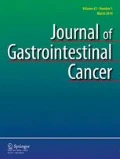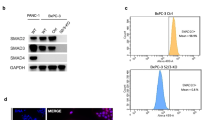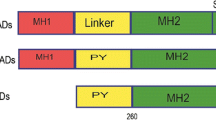Abstract
Smad4/DPC4 is a tumor suppressor gene frequently inactivated in gastrointestinal carcinomas. Smad4 encodes a key intracellular transmitter for signals of the TGF-β superfamily of cytokines. TGF-β potently inhibits the growth of normal epithelial cells but tumor cells are frequently resistant; it has been assumed that loss of Smad4 during tumor progression relieves this inhibition. Mediating TGF-β responses is only one of the many putative functions of Smad4 as a signaling molecule. Smad proteins are versatile transcriptional co-modulators whose activities depend on the genetic makeup of a cell. We have used restoration of Smad4 in deficient cancer cells as an unbiased approach to decipher Smad4’s tumor suppressor functions. Stable reexpression of Smad4 in human colon and pancreatic cancer cells potently suppressed tumor growth in vivo in nude mice. Surprisingly, it was not adequate to suppress tumor cell growth in vitro, nor did it restore TGF-β responsiveness. Rather, Smad4 restoration influenced angiogenesis, decreasing expression of vascular endothelial growth factor and increasing expression of thrombospondin-1. These findings suggest that the acquisition of TGF-β resistance and loss of Smad4 may be independent consecutive events in the tumorigenic process. They define the control of an angiogenic switch as a novel alternative mechanism of tumor suppression for Smad4.
Similar content being viewed by others
References
Massague J, Chen YG. Controlling TGF-beta signaling. Genes Dev 2000;14:627–644.
Moustakas A, Souchelnytskyi S, Heldin CH. Smad regulation in TGF-beta signal transduction. J Cell Sci 2001;114:4359–4369.
Miyazono K. TGF-beta signaling by Smad proteins. Cytokine Growth Factor Rev 2000;11:15–22.
Zhang Y, Derynck R. Regulation of Smad signalling by protein associations and signalling crosstalk. Trends Cell Biol 1999;9:274–279.
Verschueren K, Huylebroeck D. Remarkable versatility of Smad proteins in the nucleus of transforming growth factor-β activated cells. Cytokine Growth Factor Rev 1999;10:187–199.
ten Dijke P, Miyazono K, Heldin C. Signaling inputs converge on nuclear effectors in TGF-beta signaling. Trends Biochem Sci 2000;25:64–70.
Attisano L, Wrana JL. Smads as transcriptional co-modulators. Curr Opin Cell Biol 2000;12:235–243.
Massague J, Blain S, Lo R. TGFbeta signaling in growth control, cancer, and heritable disorders. Cell 2000;103:295–309.
Hahn SA, Schutte M, Hoque ATM, et al. DPC4, a candidate tumor suppressor gene at human chromosome 18q21.1. Science 1996;271:350–353.
Hahn SA, Seymour AB, Hoque ATMS, et al. Allelotype of pancreatic adenocarcinoma using xenograft enrichment. Cancer Res 1995;55:4670–4675.
Hahn SA, Bartsch D, Schroers A, et al. Mutations of the DPC4/Smad4 Gene in Biliary Tract Carcinoma. Cancer Res 1998;58:1124–1126.
Miyaki M, Iijima T, Konishi M, et al. Higher frequency of Smad4 gene mutation in human colorectal cancer with distant metastasis. Oncogene 1999;18:3098–3103.
Maitra A, Molberg K, Albores-Saavedra J, Lindberg G. Loss of dpc4 expression in colonic adenocarcinomas correlates with the presence of metastatic disease. Am J Pathol 2000;157:1105–1111.
Blaker H, von Herbay A, Penzel R, Gross S, Otto HF. Genetics of adenocarcinomas of the small intestine: frequent deletions at chromosome 18q and mutations of the SMAD4 gene. Oncogene 2002;21:158–164.
Howe JR, Roth S, Ringold JC, et al. Mutations in the SMAD4/DPC4 gene in juvenile polyposis. Science 1998; 280:1086–1088.
Uchida K, Nagatake M, Osada H, et al. Somatic in vivo alterations of the JV18-1 gene at 18q21 in human lung cancers. Cancer Res 1996;56:5583–5585.
Eppert K, Scherer SW, Ozcelik H, et al. MADR2 maps to 18q21 and encodes a TGFβ-regulated MAD-related protein that is functionally mutated in colorectal carcinoma. Cell 1996;86:543–552.
Xu X, Brodie S, Yang X, et al. Haploid loss of the tumor suppressor Smad4/Dpc4 initiates gastric polyposis and cancer in mice. Oncogene 2000;19:1868–1874.
Luukko K, Ylikorkala A, Makela TP. Developmentally regulated expression of Smad3, Smad4, Smad6, and Smad7 involved in TGF-beta signaling. Mech Dev 2001;101:209–212.
Flanders KC, Kim ES, Roberts AB. Immunohistochemical expression of Smads 1–6 in the 15-day gestation mouse embryo: signaling by BMPs and TGF-betas. Dev Dyn 2001;220:141–154.
Mulder KM. Role of Ras and Mapks in TGFbeta signaling. Cytokine Growth Factor Rev 2000;11:23–35.
Ulloa L, Doody J, Massague J, Inhibition of transforming growth factor-beta/SMAD signalling by the interferongamma/STAT pathway. Nature 1999;397:710–713.
Bitzer M, von Gersdorff G, Liang D, et al. A mechanism of suppression of TGF-beta/SMAD signaling by NF-kappa B/RelA. Genes Dev 2000;14:187–197.
Zawel L, Dai J, Buckhaults S, Zhou S, Kinzler K, Vogelstein B, Kern S. Human Smad3 and Smad4 and sequence-specific transcription activators. Mol Cell 1998;1:611–617.
Wrana J, Attisano L. The Smad pathway. Cytokine Growth Factor Rev 2000;11:5–13.
Wrana JL. Regulation of Smad activity. Cell 2000;100:189–192.
Hanahan D, Weinberg RA. The hallmarks of cancer. Cell 2000;100:57–70.
Risau W. Mechanisms of angiogenesis. Nature 1997;386:671–674.
Folkman J. Angiogenesis, in Harrison’s Principles of Internal Medicine, 15th ed., EF Braunwald AS, Kasper DL, Hauser SL, Longo DL, Jameson JL, eds., McGraw-Hill, New York: 2001;pp.517–530.
Greenblatt M, Shubi P. Tumor angiogenesis: transfilter diffusion studies in the hamster by the transparent chamber technique. J Natl Cancer Inst 1968;41:111–124.
Ehrmann RL, Knoth M. Choriocarcinoma. Transfilter stimulation of vasoproliferation in the hamster cheek pouch. Studied by light and electron microscopy. J Natl Cancer Inst 1968;41:1329–1341.
Folkman J. Tumor angiogenesis: therapeutic implications. N Engl J Med 1971;285:1182–1186.
Hanahan D, Folkman J. Patterns and emerging mechanisms of the angiogenic switch during tumorigenesis. Cell 1996;86:353–364.
Hanahan D. Heritable formation of pancreatic beta-cell tumours in transgenic mice expressing recombinant insulin/simian virus 40 oncogenes. Nature 1985;315:115–122.
Folkman J, Watson K, Ingber D, Hanahan D. Induction of angiogenesis during the transition from hyperplasia to neoplasia. Nature 1989;339:58–61.
Liotta LA, Steeg PS, Stetler-Stevenson WG. Cancer metastasis and angiogenesis: an imbalance of positive and negative regulation. Cell 1991;64:327–336.
Bouck N, Stellmach V, Hsu S. How tumors become angiogenic. Adv Cancer Res 1996;69:135–174.
Senger DR, Galli SJ, Dvorak AM, Perruzzi CA, Harvey VS, Dvorak HF. Tumor cells secrete a vascular permeability factor that promotes accumulation of ascites fluid. Science 1983;219:983–985.
Good DJ, Polverini PJ, Rastinejad F, et al. A tumor suppressor-dependent inhibitor of angiogenesis is immunologically and functionally indistinguishable from a fragment of thrombospondin. Proc Natl Acad Sci USA 1990;87:6624–6628.
Bergers G, Brekken R, McMahon G, et al. Matrix metalloproteinase-9 triggers the angiogenic switch during carcinogenesis. Nat Cell Biol 2000;2:737–744.
Rodriguez-Manzaneque JC, Lane TF, Ortega MA, Hynes RO, Lawler J, Iruela-Arispe ML. Thrombospondin-1 suppresses spontaneous tumor growth and inhibits activation of matrix metalloproteinase-9 and mobilization of vascular endothelial growth factor. Proc Natl Acad Sci USA 2001;98:12,485–12,490.
Schwarte-Waldhoff I, Volpert O, Bouck N, et al. Smad4/DPC4-mediated tumor suppression through suppression of angiogenesis. Proc Natl Acad Sci USA 2000;97:9624–9629.
Carmeliet P, Ferreira V, Breier G, et al. Abnormal blood vessel development and lethality in embryos lacking a single VEGF allele. Nature 1996;380:435–439.
Siemeister G, Martiny-Baron G, Marme D. The pivotal role of VEGF in tumor angiogenesis: molecular facts and therapeutic opportunities. Cancer Metastasis Rev 1998;17:241–248.
Shi Q, Le X, Abbruzzese JL, et al. Constitutive Sp1 activity is essential for differential constitutive expression of vascular endothelial growth factor in human pancreatic adenocarcinoma. Cancer Res 2001;61:4143–4154.
Moustakas A, Kardassis D. Regulation of the human p21/WAF/Cip1 promoter in hepatic cells by functional interactions between Sp1 and Smad family members. Proc Natl Acad Sci USA 1998;95:6733–6738.
Tachibana I, Imoto M, Adjei PN, et al. Overexpression of the TGFbeta-regulated zinc finger encoding gene, TIEG, induces apoptosis in pancreatic epithelial cells. J Clin Invest 1997;99:2365–2374.
Cook T, Urrutia R. TIEG proteins join the Smads as TGF-beta-regulated transcription factors that control pancreatic cell growth. Am J Physiol Gastrointest Liver Physiol 2000;278:G513-G521.
Dennler S, Itoh S, Vivien D, ten Dijke P, Huet S, Gauthier J. Direct binding of Smad3 and Smad4 to critical TGF-β-inducible elements in the promoter of human plasminogen activator inhibitor-type 1 gene. EMBO J 1998;17:3091–3100.
Sanchez-Elsner T, Botella LM, Velasco B, Corbi A, Attisano L, Bernabeu C. Synergistic cooperation between hypoxia and transforming growth factor-beta pathways on human vascular endothelial growth factor gene expression. J Biol Chem 2001;276:38,527–38,535.
Carmeliet P. Mechanisms of angiogenesis and arteriogenesis. Nat Med 2000;6:389–395.
Pepper MS. Transforming growth factor-beta: vasculogenesis, angiogenesis, and vessel wall integrity. Cytokine Growth Factor Rev 1997;8:21–43.
Kerr LD, Miller DB, Matrisian LM. TGF-beta 1 inhibition of transin/stromelysin gene expression is mediated through a Fos binding sequence. Cell 1990;61:267–278.
Yagi K, Furuhashi M, Aoki H, et al. c-myc is a downstream target of the Smad pathway. J Biol Chem 2002;277:854–861.
Chen CR, Kang Y, Massague J. Defective repression of c-myc in breast cancer cells: A loss at the core of the transforming growth factor beta growth arrest program. Proc Natl Acad Sci USA 2001;98:992–999.
Schwarte-Waldhoff I, Klein S, Blass-Kampmann S, et al. DPC4/SMAD4 mediated tumor suppression of colon carcinoma cells is associated with reduced urokinase expression. Oncogene 1999;18:3152–3158.
Wilentz RE, Iacobuzio-Donahue CA, Argani P, et al. Loss of expression of Dpc4 in pancreatic intraepithelial neoplasia: evidence that DPC4 inactivation occurs late in neoplastic progression. Cancer Res 2000;60.
Luttges J, Galehdari H, Brocker V, et al. Allelic loss is often the first hit in the biallelic inactivation of the p53 and DPC4 genes during pancreatic carcinogenesis. Am J Pathol 2001;158:1677–1683.
Akhurst RJ, Balmain A. Genetic events and the role of TGF beta in epithelial tumour progression. J Pathol 1999;187:82–90.
Reiss M. TGF-beta and cancer. Microbes Infect 1999;1:1327–1347.
Derynck R, Akhurst RJ, Balmain A. TGF-beta signaling in tumor suppression and cancer progression. Nat Genet 2001;29:117–129.
Piek E, Roberts AB. Suppressor and oncogenic roles of transforming growth factor-beta and its signaling pathways in tumorigenesis. Adv Cancer Res 2001;83:1–54.
Tang B, Böttinger EP, Jakowlew SB, et al. Transforming growth factor-β1 is a new form of tumor suppressor with true haploid insufficiency. Nat Med 1998;4:802–807.
Muller N, Reinacher-Schick A, Baldus S, et al. Smad4 induces the tumor suppressor E-cadherin and P-cadherin in colon carcinoma cells. Oncocene 2002;21:6049–6058.
Author information
Authors and Affiliations
Corresponding author
Rights and permissions
About this article
Cite this article
Schwarte-Waldhoff, I., Schmiegel, W. Smad4 transcriptional pathways and angiogenesis. Int J Gastrointest Canc 31, 47–59 (2002). https://doi.org/10.1385/IJGC:31:1-3:47
Issue Date:
DOI: https://doi.org/10.1385/IJGC:31:1-3:47




